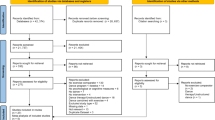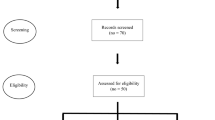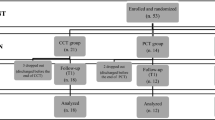Abstract
Background
In Parkinson’s disease (PD), physical activity may represent a possible non-pharmacological intervention not only for improving motor symptoms but also for modulating cognitive impairment.
Aims
To evaluate the efficacy of an intensive physical program on cognitive functions in mid-stage PD patients with mild cognitive impairment (PD-MCI) over a 6-month follow-up.
Methods
This is a 6-month randomized controlled follow-up study. 40 PD-MCI patients were randomized to receive physical therapy (PT) or no specific intervention beside drug treatment (CT). Cognitive and motor assessments were performed at baseline (T0), 4 weeks after baseline (T1) and 6 months after T0. In a previous study, we reported a significant improvement in global cognitive functioning and attention/working-memory at T1. Here, we evaluated the residual effect of the training intervention at 6 months on both cognitive and motor performances.
Results
Intra-group analysis showed that at T2 most of cognitive and motor performances remained stable in the PT when compared to T0, while a significant worsening was observed in the CT. Between-group comparison at T2 showed significantly better results in PT than CT as regards MoCA and motor scales. The percentage change of cognitive and motor performances between T1 and T2 confirmed the benefit of physical therapy on global cognitive functioning scores (MMSE and MoCA).
Conclusions
In this follow-up extension of a longitudinal randomized controlled study, we demonstrated that physical therapy has a positive effect on cognitive functions, which extends beyond the duration of the treatment itself to, at least temporarily, reducing cognitive decline.
Trial registration
Trial registration number (ClinicalTrials.gov): NCT04012086 (9th July 2019).




Similar content being viewed by others
Data availability
The datasets presented in this study can be found in online repositories. The names of the repository/repositories and accession number(s) can be found below: [Zenodo; 10.5281/zenodo.4710446].
References
Gallagher DA, Lees AJ, Schrag A (2010) What are the most important nonmotor symptoms in patients with Parkinson’s disease and are we missing them? Mov Disord 25:2493–2500. https://doi.org/10.1002/mds.23394
Litvan I, Aarsland D, Adler CH et al (2011) MDS task force on mild cognitive impairment in Parkinson’s disease: critical review of PD-MCI. Mov Disord 26:1814–1824. https://doi.org/10.1002/mds.23823
Goldman JG, Weintraub D (2015) Advances in the treatment of cognitive impairment in Parkinson’s disease. Mov Disord 30:1471–1489. https://doi.org/10.1002/mds.26352
Livingston G, Sommerlad A, Orgeta V et al (2017) Dementia prevention, intervention, and care. Lancet 390:2673–2734. https://doi.org/10.1016/S0140-6736(17)31363-6
Bernini S, Alloni A, Panzarasa S et al (2019) A computer-based cognitive training in Mild Cognitive Impairment in Parkinson’s Disease. NeuroRehabilitation 44:555–567. https://doi.org/10.3233/NRE-192714
Leung IHK, Walton CC, Hallock H et al (2015) Cognitive training in Parkinson disease: a systematic review and meta-analysis. Neurology 85:1843–1851. https://doi.org/10.1212/WNL.0000000000002145
Stuckenschneider T, Askew CD, Menêses AL et al (2019) The effect of different exercise modes on domain-specific cognitive function in patients suffering from Parkinson’s disease: a systematic review of randomized controlled trials. J Parkinsons Dis 9:73–95. https://doi.org/10.3233/JPD-181484
Salgado S, Williams N, Kotian R et al (2013) An evidence-based exercise regimen for patients with mild to moderate Parkinson’s disease. Brain Sci 3:87–100. https://doi.org/10.3390/brainsci3010087
Reynolds GO, Otto MW, Ellis TD et al (2016) The therapeutic potential of exercise to improve mood, cognition, and sleep in Parkinson’s disease. Mov Disord 31:23–38. https://doi.org/10.1002/mds.26484
Murray DK, Sacheli MA, Eng JJ et al (2014) The effects of exercise on cognition in Parkinson’s disease: a systematic review. Transl Neurodegener 3:1–13. https://doi.org/10.1186/2047-9158-3-5
Da Silva FC, Iop RDR, De Oliveira LC et al (2018) Effects of physical exercise programs on cognitive function in Parkinson’s disease patients: a systematic review of randomized controlled trials of the last 10 years. PLoS ONE 13:1–19. https://doi.org/10.1371/journal.pone.0193113
Picelli A, Varalta V, Melotti C et al (2016) Effects of treadmill training on cognitive and motor features of patients with mild to moderate Parkinson’s disease: a pilot, single-blind, randomized controlled trial. Funct Neurol 31:25–31. https://doi.org/10.11138/fneur/2016.31.1.025
Pietrelli A, Lopez-Costa J, Goñi R et al (2012) Aerobic exercise prevents age-dependent cognitive decline and reduces anxiety-related behaviors in middle-aged and old rats. Neuroscience 202:252–266. https://doi.org/10.1016/j.neuroscience.2011.11.054
Tuon T, Valvassori SS, Dal Pont GC et al (2014) Physical training prevents depressive symptoms and a decrease in brain-derived neurotrophic factor in Parkinson’s disease. Brain Res Bull 108:106–112. https://doi.org/10.1016/j.brainresbull.2014.09.006
Ferrazzoli D, Ortelli P, Cucca A et al (2020) Motor-cognitive approach and aerobic training: a synergism for rehabilitative intervention in Parkinson’s disease. Neurodegener Dis Manag 10:41–55. https://doi.org/10.2217/nmt-2019-0025
Banks SJ, Bayram E, Shan G et al (2019) Non-motor predictors of freezing of gait in Parkinson’s disease. Gait Posture 68:311–316. https://doi.org/10.1016/j.gaitpost.2018.12.009
McKee KE, Hackney ME (2013) The effects of adapted tango on spatial cognition and disease severity in Parkinson’s disease. J Mot Behav 45:519–529. https://doi.org/10.1080/00222895.2013.834288
Pompeu JE, dos Santos Mendes FA, da Silva KG et al (2012) Effect of Nintendo WiiTMBased motor and cognitive training on activities of daily living in patients with Parkinson’s disease: a randomised clinical trial. Physiother (United Kingdom) 98:196–204. https://doi.org/10.1016/j.physio.2012.06.004
Nadeau A, Pourcher E, Corbeil P (2014) Effects of 24 wk of treadmill training on gait performance in Parkinson’s disease. Med Sci Sport Exerc 46:645–655. https://doi.org/10.1249/MSS.0000000000000144
David FJ, Robichaud JA, Leurgans SE et al (2015) Exercise improves cognition in Parkinson’s disease: the PRET-PD randomized, clinical trial. Mov Disord 30:1657–1663. https://doi.org/10.1002/mds.26291
Silveira CRA, Roy EA, Intzandt BN, Almeida QJ (2018) Aerobic exercise is more effective than goal-based exercise for the treatment of cognition in Parkinson’s disease. Brain Cogn 122:1–8. https://doi.org/10.1016/j.bandc.2018.01.002
Avenali M, Picascia M, Minafra B et al (2019) Intensive physical therapy mitigates cognitive decline in people with Parkinson’ s disease. J Alzheimers Dis Park 9:475. https://doi.org/10.4172/2161-0460.1000475
Postuma RB, Berg D, Stern M et al (2015) MDS clinical diagnostic criteria for Parkinson’s disease. Mov Disord 30:1591–1601. https://doi.org/10.1002/mds.26424
Hoehn MM, Yahr MD (1967) Parkinsonism: onset, progression and mortality. Neurology 17:427–442. https://doi.org/10.1212/wnl.17.5.427
Litvan I, Goldman JG, Tröster AI et al (2012) Diagnostic criteria for mild cognitive impairment in Parkinson’s disease: Movement Disorder Society Task Force guidelines. Mov Disord 27:349–356. https://doi.org/10.1002/mds.24893
Magni E, Binetti G, Bianchetti A et al (1996) Mini-Mental State Examination: a normative study in Italian elderly population. Eur J Neurol 3:198–202. https://doi.org/10.1111/j.1468-1331.1996.tb00423.x
Conti S, Bonazzi S, Laiacona M et al (2015) Montreal Cognitive Assessment (MoCA)-Italian version: regression based norms and equivalent scores. Neurol Sci 36:209–214. https://doi.org/10.1007/s10072-014-1921-3
Spinnler H (1987) Italian standardization and classification of Neuropsychological tests. The Italian Group on the Neuropsychological Study of Aging. Ital J Neurol Sci Suppl 8:1–120
Carlesimo GA, Caltagirone C, Gainotti G et al (1996) The mental deterioration battery: normative data, diagnostic reliability and qualitative analyses of cognitive impairment. Eur Neurol 36:378–384. https://doi.org/10.1159/000117297
Appollonio I, Leone M, Isella V et al (2005) The Frontal Assessment Battery (FAB): normative values in an Italian population sample. Neurol Sci 26:108–116. https://doi.org/10.1007/s10072-005-0443-4
Giovagnoli AR, Del Pesce M, Mascheroni S et al (1996) Trail making test: normative values from 287 normal adult controls. Ital J Neurol Sci 17:305–309. https://doi.org/10.1007/BF01997792
Goetz CG, Tilley BC, Shaftman SR et al (2008) Movement Disorder Society-sponsored revision of the Unified Parkinson’s Disease Rating Scale (MDS-UPDRS): Scale presentation and clinimetric testing results. Mov Disord 23:2129–2170. https://doi.org/10.1002/mds.22340
Tinetti ME (1986) Performance-oriented assessment of mobility problems in elderly patients. J Am Geriatr Soc 34:119–126. https://doi.org/10.1111/j.1532-5415.1986.tb05480.x
Hauser SL, Dawson DM, Lehrich JR et al (1983) Intensive immunosuppression in progressive multiple sclerosis. N Engl J Med 308:173–180. https://doi.org/10.1056/NEJM198301273080401
Uc EY, Doerschug KC, Magnotta V et al (2014) Phase I/II randomized trial of aerobic exercise in Parkinson disease in a community setting. Neurology 83:413–425. https://doi.org/10.1212/WNL.0000000000000644
Hou L, Chen W, Liu X et al (2017) Exercise-induced neuroprotection of the Nigrostriatal dopamine system in Parkinson’s disease. Front Aging Neurosci 9:358. https://doi.org/10.3389/fnagi.2017.00358
Petzinger GM, Fisher BE, McEwen S et al (2013) Exercise-enhanced neuroplasticity targeting motor and cognitive circuitry in Parkinson’s disease. Lancet Neurol 12:716–726. https://doi.org/10.1016/S1474-4422(13)70123-6
Smith PJ, Blumenthal JA, Hoffman BM et al (2010) Aerobic exercise and neurocognitive performance: a meta-analytic review of randomized controlled trials. Psychosom Med 72:239–252. https://doi.org/10.1097/PSY.0b013e3181d14633
Intzandt B, Beck EN, Silveira CRA (2018) The effects of exercise on cognition and gait in Parkinson’s disease: a scoping review. Neurosci Biobehav Rev 95:136–169. https://doi.org/10.1016/j.neubiorev.2018.09.018
Weng TB, Pierce GL, Darling WG et al (2017) The acute effects of aerobic exercise on the functional connectivity of human brain networks. Brain Plast 2:171–190. https://doi.org/10.3233/BPL-160039
Fontanesi C, Kvint S, Frazzitta G et al (2016) Intensive rehabilitation enhances lymphocyte BDNF-TrkB signaling in patients with Parkinson’s disease. Neurorehabil Neural Repair 30:411–418. https://doi.org/10.1177/1545968315600272
Leckie RL, Oberlin LE, Voss MW et al (2014) BDNF mediates improvements in executive function following a 1-year exercise intervention. Front Hum Neurosci 8:985. https://doi.org/10.3389/fnhum.2014.00985
Ahlskog JE (2011) Does vigorous exercise have a neuroprotective effect in Parkinson disease? Neurology 77:288–294. https://doi.org/10.1212/WNL.0b013e318225ab66
Nagano-Saito A, Martinu K, Monchi O (2014) Function of basal ganglia in bridging cognitive and motor modules to perform an action. Front Neurosci 8:187. https://doi.org/10.3389/fnins.2014.00187
Leisman G, Melillo R (2013) The basal ganglia: motor and cognitive relationships in a clinical neurobehavioral context. Rev Neurosci 24:9–25. https://doi.org/10.1515/revneuro-2012-0067
Funding
This work was supported by a grant of the Italian Ministry of Health (Ricerca Corrente 2017–2019).
Author information
Authors and Affiliations
Contributions
MA and SB: study concept and design, acquisition of data, analysis and interpretation of data, and drafting of the manuscript. All the authors: interpretation of data. MP: acquisition of data. ES and CT: critical revision of the manuscript for important intellectual content.
Corresponding author
Ethics declarations
Conflict of interest
The authors declare that they have no conflict of interest.
Ethical approval
The study was performed in accordance with the guidelines of the Declaration of Helsinki. The study was approved by local Ethics Committee of San Matteo Hospital (Pavia, Italy).
Informed consent
Informed consent was obtained from all individual participants included in the study.
Additional information
Publisher's Note
Springer Nature remains neutral with regard to jurisdictional claims in published maps and institutional affiliations.
Rights and permissions
About this article
Cite this article
Avenali, M., Picascia, M., Tassorelli, C. et al. Evaluation of the efficacy of physical therapy on cognitive decline at 6-month follow-up in Parkinson disease patients with mild cognitive impairment: a randomized controlled trial. Aging Clin Exp Res 33, 3275–3284 (2021). https://doi.org/10.1007/s40520-021-01865-4
Received:
Accepted:
Published:
Issue Date:
DOI: https://doi.org/10.1007/s40520-021-01865-4




